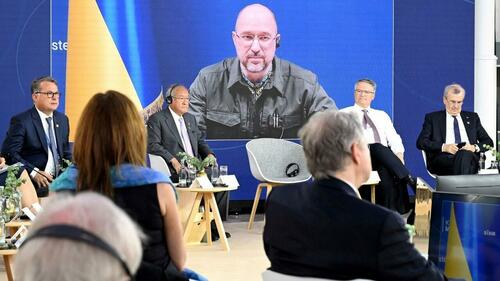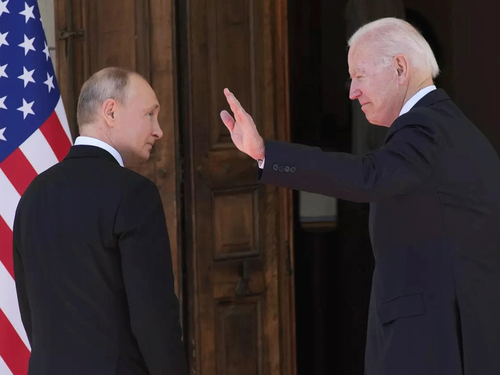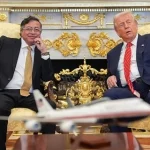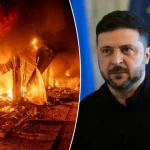
Russia's large-scale air assaults across Ukraine Monday into Tuesday has set off a flurry of activity and discussion among G7 countries and NATO powers. Both organizations are holding urgent meetings in response, pledging continued "undeterred and steadfast" financial and military support for Ukraine, as a Group of 7 emergency meeting said on Tuesday.
The G7 statement further emphasized "severe consequences" for Russia if it were to use chemical, biological or nuclear weapons, according to its statement, following the deaths of at least 19 Ukrainians due to the major Russian strikes on various cities Monday.

Additionally the G7 once again addressed the stalemated situation at the Russian-occupied Zaporizhzhya Nuclear Power Plant amid new accusations by Kiev that Valeriy Martyniuk, the plant's deputy director general for human resources, had been kidnapped.
"We condemn Russia’s actions at Ukraine’s Zaporizhzhya Nuclear Power Plant and the pressure exerted on the personnel of the facility. This is a further irresponsible escalation and we will hold Russia responsible for any incident caused by their actions," the G7 ministers said. "The safety, security and safeguards of the nuclear facility are paramount and we support the International Atomic Energy Agency’s efforts in this regard."
And on the latest reports the Belarus is poised to join the war in Ukraine more directly, the G7 said, "We reiterate our call on the Belarusian authorities to stop enabling the Russian war of aggression by permitting Russian armed forces to use Belarusian territory and by providing support to the Russian military. The announcement of a joint military group with Russia constitutes the most recent example of the Belarusian regime’s complicity with Russia. We renew our call on the Lukashenko regime to fully abide by its obligations under international law."
NATO too, in previewing a top-level meeting of foreign ministers set for Wednesday, vowed to stand with Ukraine "for as long as it takes," according to the words of Secretary General Jens Stoltenberg. He rejecting growing Kremlin accusations that the Western military alliance is deepening its role in the conflict:
Previewing the meeting, NATO Secretary General Jens Stoltenberg said that NATO will stand with Ukraine "for as long as it takes." He added that "NATO is not party to the conflict, but our support is playing a key role" in helping Ukraine defend itself and liberate territory, in the face of Russia’s “horrific and indiscriminate attacks on civilians and critical infrastructure”.
To a large degree the G7 and NATO statements merely repeated talking points of prior months; however, what the G7 said about the possibility of negotiations amid the escalation is the more interesting aspect, given President Vladimir Putin has just opened up the idea of talks.
"With a view to a viable post-war peace settlement, we remain ready to reach arrangements together with interested countries and institutions and Ukraine on sustained security and other commitments to help Ukraine defend itself, secure its free and democratic future, and deter future Russian aggression," the G7 statement emphasized. The below is how the G7 defined what would be the basis for a "just peace" and settlement:
- respecting the UN Charter’s protection of territorial integrity and sovereignty;
- safeguarding Ukraine’s ability to defend itself in the future;
- ensuring Ukraine’s recovery and reconstruction,
- including exploring avenues to do so with funds from Russia;
- pursuing accountability for Russian crimes committed during the war.
For the West, the first point on the "protection of territorial integrity and sovereignty" means recovery of not just seized territories of the Donbas, but Crimea as well, despite it's being in Russian possession since 2014.
Additionally, Ukraine's Zelensky has over the past weeks asserted that he's no longer willing to talk to Vladimir Putin, but would only sit down with a new Russian leader, suggesting that for Kiev talks will remain a non-starter so long as the Russian military presence remains, and as Ukrainian cities continue to come under bombardment.
Moscow responded by saying it would not end its military operations if Kyiv refuses to negotiate.
— Ellen Nakashima (@nakashimae) October 11, 2022
All of this adds up to a war that looks increasingly open-ended, as even those in Zelensky’s inner circle most open to exploring talks said Putin’s annexations marked a fatal blow.
Importantly, Putin on Tuesday through his foreign minister floated an idea for how an eventual negotiated solution might be reached. FM Sergey Lavrov responded to a question by a reporter on a comment from President Joe Biden days ago who said "it remains to be seen" whether there could be bilateral US-Russia talks on the sidelines of the G20 summit in Indonesia scheduled for mid-November. Lavrov said, according to state media...
The presidents of Russia and the US might meet on the sidelines of the G20 summit in Indonesia, provided that Washington actually wants to participate, Russian Foreign Minister Sergey Lavrov said.
"We never reject meetings, and if such a proposal comes, we will consider it," the top diplomat explained during an interview on Russian television on Tuesday. He stressed that no such proposal had been sent by the US so far, contrary to what some people may believe.
...When asked about the possibility of bilateral talks, Biden did not rule it out, telling reporters on Thursday that "it remains to be seen." Lavrov said that drawing conclusions about the schedules of the two leaders from an off-hand remark was "more suitable for journalistic analytical speculation than for real politics."

However, Lavrov followed by saying, "We have received no serious proposals for contact. There were some half-hearted approaches, which we did not reject either and suggested that the people, who want to engage with us in backdoor diplomacy, formulate concrete proposals."
He also charged that Washington has long become a "de facto" party to the conflict given the ongoing weapons shipments and intelligence-sharing relationship with Ukraine's military.
As for the possibility of the US side agreeing to bilateral talks toward ending the conflict, it remains unlikely at this moment - given especially that the US sees the Ukrainian side as currently "winning" the war through its eastern and southern offensives. Zelensky himself has of late said his forces won't give up until they liberate every inch of occupied territory.
By the time of the summit in Bali, whether the sides talk to each other is likely to be largely determinant on the actual battlefield situation. Also immensely complicating matters is the Russia-sponsored 'annexation referendums' in the four territories.
Russia’s large-scale air assaults across Ukraine Monday into Tuesday have set off a flurry of activity and discussion among G7 countries and NATO powers. Both organizations are holding urgent meetings in response, pledging continued “undeterred and steadfast” financial and military support for Ukraine, as a Group of 7 emergency meeting said on Tuesday.
The G7 statement further emphasized “severe consequences” for Russia if it were to use chemical, biological or nuclear weapons, according to its statement, following the deaths of at least 19 Ukrainians due to the major Russian strikes on various cities Monday.

Additionally, the G7 once again addressed the stalemated situation at the Russian-occupied Zaporizhzhya Nuclear Power Plant amid new accusations by Kiev that Valeriy Martyniuk, the plant’s deputy director general for human resources, had been kidnapped. “We condemn Russia’s actions at Ukraine’s Zaporizhzhya Nuclear Power Plant and the pressure exerted on the personnel of the facility. This is a further irresponsible escalation and we will hold Russia responsible for any incident caused by their actions,” the G7 ministers said. “The safety, security and safeguards of the nuclear facility are paramount and we support the International Atomic Energy Agency’s efforts in this regard.”
And on the latest reports that Belarus is poised to join the war in Ukraine more directly, the G7 said, “We reiterate our call on the Belarusian authorities to stop enabling the Russian war of aggression by permitting Russian armed forces to use Belarusian territory and by providing support to the Russian military. The announcement of a joint military group with Russia constitutes the most recent example of the Belarusian regime’s complicity with Russia. We renew our call on the Lukashenko regime to fully abide by its obligations under international law.”
NATO too, in previewing a top-level meeting of foreign ministers set for Wednesday, vowed to stand with Ukraine “for as long as it takes,” according to the words of Secretary General Jens Stoltenberg. He rejecting growing Kremlin accusations that the Western military alliance is deepening its role in the conflict:
Previewing the meeting, NATO Secretary General Jens Stoltenberg said that NATO will stand with Ukraine “for as long as it takes.” He added that “NATO is not party to the conflict, but our support is playing a key role” in helping Ukraine defend itself and liberate territory, in the face of Russia’s “horrific and indiscriminate attacks on civilians and critical infrastructure”.
To a large degree the G7 and NATO statements merely repeated talking points of prior months; however, what the G7 said about the possibility of negotiations amid the escalation is the more interesting aspect, given President Vladimir Putin has just opened up the idea of talks.
“With a view to a viable post-war peace settlement, we remain ready to reach arrangements together with interested countries and institutions and Ukraine on sustained security and other commitments to help Ukraine defend itself, secure its free and democratic future, and deter future Russian aggression,” the G7 statement emphasized. The below is how the G7 defined what would be the basis for a “just peace” and settlement:
- respecting the UN Charter’s protection of territorial integrity and sovereignty;
- safeguarding Ukraine’s ability to defend itself in the future;
- ensuring Ukraine’s recovery and reconstruction,
- including exploring avenues to do so with funds from Russia;
- pursuing accountability for Russian crimes committed during the war.
For the West, the first point on the “protection of territorial integrity and sovereignty” means recovery of not just seized territories of the Donbas, but Crimea as well, despite it’s being in Russian possession since 2014.
Additionally, Ukraine’s Zelensky has over the past weeks asserted that he’s no longer willing to talk to Vladimir Putin, but would only sit down with a new Russian leader, suggesting that for Kiev talks will remain a non-starter so long as the Russian military presence remains, and as Ukrainian cities continue to come under bombardment.
Moscow responded by saying it would not end its military operations if Kyiv refuses to negotiate.
All of this adds up to a war that looks increasingly open-ended, as even those in Zelensky’s inner circle most open to exploring talks said Putin’s annexations marked a fatal blow.— Ellen Nakashima (@nakashimae) October 11, 2022
Importantly, Putin on Tuesday through his foreign minister floated an idea for how an eventual negotiated solution might be reached. FM Sergey Lavrov responded to a question by a reporter on a comment from President Joe Biden days ago who said “it remains to be seen” whether there could be bilateral US-Russia talks on the sidelines of the G20 summit in Indonesia scheduled for mid-November. Responding to this, Lavrov said according to state media…
The presidents of Russia and the US might meet on the sidelines of the G20 summit in Indonesia, provided that Washington actually wants to participate, Russian Foreign Minister Sergey Lavrov said.
“We never reject meetings, and if such a proposal comes, we will consider it,” the top diplomat explained during an interview on Russian television on Tuesday. He stressed that no such proposal had been sent by the US so far, contrary to what some people may believe.
…When asked about the possibility of bilateral talks, Biden did not rule it out, telling reporters on Thursday that “it remains to be seen.” Lavrov said that drawing conclusions about the schedules of the two leaders from an off-hand remark was “more suitable for journalistic analytical speculation than for real politics.”

However, Lavrov followed by saying, “We have received no serious proposals for contact. There were some half-hearted approaches, which we did not reject either and suggested that the people, who want to engage with us in backdoor diplomacy, formulate concrete proposals.” He also charged that Washington has long become a “de facto” party to the conflict given the ongoing weapons shipments and intelligence-sharing relationship with Ukraine’s military.
As for the possibility of the US side agreeing to bilateral talks toward ending the conflict, it remains unlikely at this moment – given especially that the US sees the Ukrainian side as currently “winning” the war through its eastern and southern offensives. Zelensky himself has of late said his forces won’t give up until they liberate every inch of occupied territory.
By the time of the summit in Bali, whether the sides actually talk to each other is likely to be largely determinant on the actual battlefield situation. Also immensely complicating matters is the Russia-sponsored ‘annexation referendums’ in the four territories.







